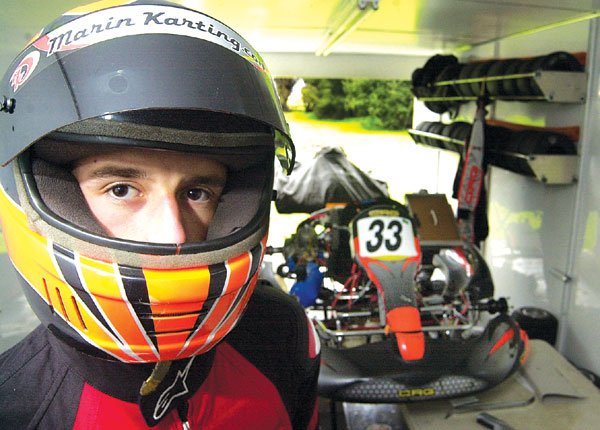Mike Hill certainly can
… and just wait ’til the 15-year-old gets his license
Walk into Mike Hill’s Gilroy house and it doesn’t take long to guess what his passion is.
Pictures adorn the walls, some of Hill suited up in his racing gear, some of his step-dad Jack Yovanov in his own racing togs, some of the pair of them together. Around the corner is a Christmas tree, but it’s not your standard tree. With NASCAR ornaments featuring race cars and drivers – and, naturally, a big old No. 3 in a prominent position – it’s the kind of tree only the most fervent racing fan would think to put up.
Hill’s living room is littered with racing trophies, as well as a wheel clock, a steering wheel for a video game and an Indy 500 pin-ball machine.
It’s a decorating theme that hits you square on the nose … nothing subtle about it. Hill and Yovanov like things that go fast, and things that describe things that go fast.
But Hill himself isn’t just a fan. Since 2001, he’s traveled across the nation racing small, fast cars. An excellent student at school, Hill is also a student of racing, possessing a great deal of knowledge about fast cars, particularly go-carts and quarter midgets.
And the kicker: At just 15-years-old, Hill can’t drive on city streets.
The sophomore at Valley Christian in San Jose moved to Gilroy in 1999 from Sunnyvale, when Yovanov set out to build a work shop in Gilroy for his race cars.
In addition to racing, he was also a member of Valley Christian’s junior varsity football team, and currently plays on the JV soccer team.
Now Hill will travel to Laguna Seca Speedway to compete in the Skip Barber Shoot Off in his ICC pro class go-kart. The prize: a full travel budget to race in the Skip Barber series around the nation.
The three-day race, beginning Jan. 7, pits Hill against 46 other racers from around the world. The Shoot Off isn’t just a flat out race, though. Race car celebrity judges at each turn critique each driver’s performance and offer advice for improvement. The racers who best act on that advice in the eyes of judges earn points toward the win.
In preparation for the race, Hill spent five days training at Laguna Seca. There he learned the ins and outs of the speedway, including the infamous ninth curve where racers lose sight of the track for about 100 feet.
“There’s a tree that everybody focuses on (to keep their bearings) and prays it doesn’t move,” Hill jokes. “Of course, you go over the hill and the tree didn’t move.”
Hill has another training technique familiar to kids of all ages. He plays video games.
It’s not as far fetched as it seems. Microsoft’s CART Precision Racing game features Laguna Seca Speedway – simulations that are the next best thing to racing the course itself. The latest version of the game is remarkably detailed, down to the tree on the ninth curve.
Hill’s ICC is what is called a “shifter go-kart,” basically a souped up go-kart with a dirt bike transmission. Hill has raced 80cc’s for the past year, but for the Shoot Off, he will race in a 125cc.
Yovanov exposed his stepson to racing at an early age. The elder speedster began racing in high school and continued in college. After a stint in the Navy, he took a step back from racing and worked at Jet-Aim before moving on to Lockheed.
Hill competed in his first race at the age of 5. It wasn’t the most successful debut.
“I hit a wall and I smashed my ego,” the youngster said.
It took a few years for him to get back into the saddle after that early setback. Upon moving to Gilroy, he felt the time was right to begin racing again.
The decision has paid off.
In 2001, his first year of competition, Hill took two rookie-of-the-year honors and could have gone on to national competition, but he and Yovanov decided to wait a year.
In 2002, Hill did go to the nationals and sped his way into third place in his age group.
Since then he has returned four times.
In order to get ready for a race, Hill watches his diet and gets to bed early. But before he nods off, he pictures the track in his mind and takes a few imaginary laps.
Those visualization exercises appear to be working. Hill’s growing collection of trophies from up and down California and beyond prove it.














